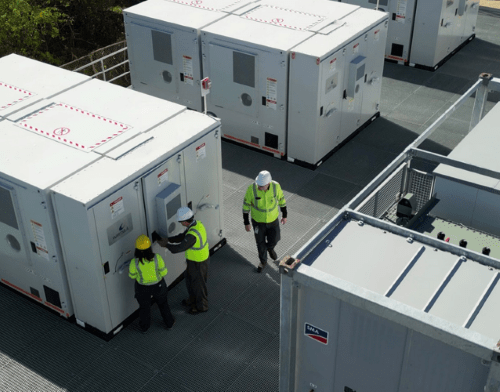(CNS): CUC said it spent $50million of funds raised last year through green notes on green initiatives furthering the company’s goal of environmental sustainability, social responsibility, and long-term economic resilience. With the publication of its first Green Finance Report and its latest Sustainability Report, Grand Cayman’s power provider is touting its green-credentials and commitment to the renewable transition. But at the same time almost 97% of the power Cayman is burning is still coming from diesel.
CUC said the two reports are interconnected and serve as critical tools in the transition towards renewable energy providing all of Cayman’s electricity by 2045 in line with the 2024-2045 National Energy Policy.
“Sustainability reporting outlines CUC’s environmental impact, resource efficiency, and climate-related goals, while green finance reporting tracks how financial instruments like green bonds or climate linked loans are used to fund environment related initiatives,” the company said in a release announcing the publication of the reports. “Together they provide transparency and accountability to stakeholders, ensuring that capital is being directed toward projects that align with environmental commitments.”
The two reports show how CUC is moving towards accommodating utility scale solar with battery plants, among other things, including the transition to an EV Fleet and installing charging stations, helping reduce wasted energy and putting around six kilometres of lines underground to improve resilience. The firm believes that green financing will play a significant part in the coming transition to 100% renewables in Cayman over the next two decades.
Letitia Lawrence, the firm’s Chief Financial Officer said it represents a shift in the financial sector too, to solutions that are environmentally sound, socially responsible and economically prosperous that are becoming viable in advancing the climate transition.
“CUC’s commitment to integrating sustainability into our financial practices is an essential component to building resilient climate frameworks that advance environmental stewardship and social equity,” she said in the report. “We are integrating green financing principles to accelerate our ESG goals. By championing early efforts in green investments, CUC is strengthening our company’s response to climate action while
supporting broader socio-environmental development.
“Green financing is not just a funding mechanism — it’s a strategic tool for shaping a resilient and climate-conscious future for our region,” she added.
But the company is also aware of the work that is needed to be done in the Cayman Islands if we are to reach the first main national energy policy target of generating 70% of our electricity from green sources in just 12 years.
“Prioritizing the deployment of green note proceeds within the Cayman Islands is essential, given the scale of climate transitions and the investments required in the coming decades,” Judith Bennett the company’s director of sustainable finance said. “CUC is well-positioned to meet these challenges and opportunities by championing future-ready solutions and adaptive growth.”
With investors focused on environmental sustainability, social responsibility, and long-term economic resilience these issues are increasingly shaping the global transition to a low-carbon future. The reports reaffirm CUC’s dedication to sustainable finance and offers meaningful insights into its ongoing progress and initiatives in this critical area, officials said.
Between May 2022 and May 2025 CUC said it has seen an estimated reduction of 8,551 metric tons of CO2 through green note funded initiatives which has been independently verified. According to the sustainability report in 2024 the power company commissioned Grand Cayman’s first utility-scale Battery Energy Storage System, of 20 megawatts, accelerated efforts in system hardening and grid resiliency, spent, $6.6million on customer energy efficiency programmes and $2.6 million in low carbon transportation projects.
President and CEO, Richard Hew said that some companies and jurisdictions are scaling back their sustainability efforts CUC was committed to advancing theirs.
“Over the past year, we’ve made meaningful progress in expanding energy transition and grid resiliency investments and delivering innovative solutions that help our customers live more efficiently and conserve energy,” he said. “Our goal is to continue working collaboratively to ensure we provide safe, reliable, and affordable service to our customers. I’m proud of the team’s ongoing engagement as responsible corporate citizens and their dedication to supporting employee development and growth.”
Fully in support of the Cayman Islands National Energy Policy’s goals of 70% renewable energy penetration by 2037, Hew added that to drive the progress toward the “ambitious targets” emphasis will be placed on energy transformation and affordability as well as system reliability and resilience. Focused on advancing renewable energy solutions once again CUC committed to working with the regulator and stakeholders to deliver a sustainable energy future that is accessible and affordable for all.
Cayman has dragged its feet on the new to transition to renewables, through a combination of issues relating to both the private sector companies — CUC that own the grids and provides power on Grand Cayman and Islandenergy.ky, the Dart owned company that provides power on the Sister Islands, as well as difficulties with the regulator.
But worldwide, the renewable sector is booming.
Earlier this month Ember, a global energy think tank released data showing that renewable energy overtook coal as the world’s leading source of electricity in the first half of 2025. Electricity demand is growing around the world but solar and wind use has grown so much it has met 100% of the extra electricity demand, even helping drive a slight decline in coal and gas use. Developing countries, especially China, led the clean energy charge.
However, richer nations including the US in particular and some European countries are still reliant on planet-warming fossil fuels.
See the reports and more information on the CUC website www.cuc-cayman.com.
















